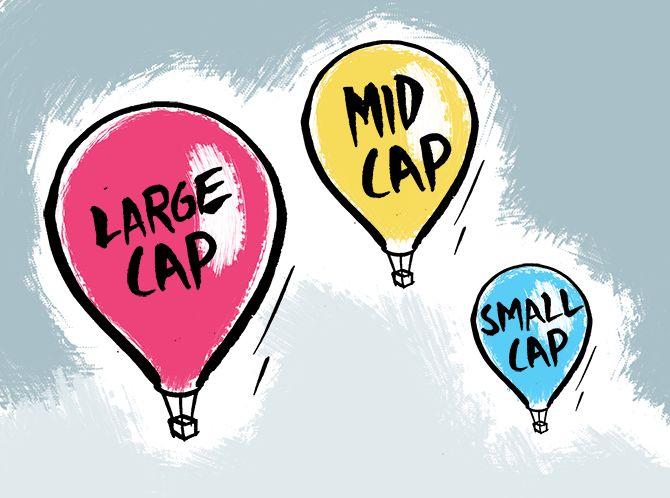The rally in the equity markets in the second half of 2023 has led to a sharp surge in the cutoff for stocks to qualify as largecaps and midcaps.

On the latest list put out by the Association of Mutual Funds in India (Amfi), the smallest largecap stock now has a market capitalisation (m-cap) of Rs 67,000 crore, 35 per cent higher than in July 2023.
In the case of midcaps, the cutoff has surged 26 per cent to Rs 22,000 crore.
Amfi releases a fresh list of largecap, midcap and smallcap stocks every six months. The top 100 stocks, according to the average m-cap in the previous six months, qualify to be largecaps.
The next 150 are labelled as midcaps and the rest smallcaps.
Owing to their continued outperformance, public-sector companies dominate the latest list of new entrants in the largecap space.
These include Power Finance Corporation, Indian Railway Finance Corporation, REC Ltd, Union Bank, and Indian Overseas Bank, shows a report by Nuvama Alternative & Quantitative Research.
Their six-month average m-cap surged anywhere between 43 per cent and 117 per cent.
Including the previous reclassification in July, when Punjab National Bank, IDBI Bank, and Canara Bank had moved from the midcap to the largecap basket, the number of public-sector banks that have been upgraded to the largecap list stands at five.
In a recent report, ICICI Securities said the current format of stock classification might not be the right approach, given the surge in the upper threshold of smallcap stocks.
Globally, smallcaps are classified as stocks within the market cap range of $300 million to $2 billion irrespective of their market cap rank.
Hence the current methodology of rank-based approach may need to transition to a fixed interval method based on judgement at some point in time, the brokerage said in a note.
According to the latest classification, the largest smallcap has an average m-cap of Rs 21,976 crore ($2.6 billion).
In January 2018, the largest smallcap stock had an m-cap of Rs 8,580 crore.
As the economy expands along with more new listings in the large and mid-cap space, the 251st ranked stock s market cap (upper threshold for small caps) will continue to expand and may not conform to global standards, the report added.
Among largecap stocks, Reliance Industries remains the largest with a m-cap of Rs 16.4 trillion.
Apart from the public companies, Macrotech Developer and Polycab India have moved up from midcap to largecap.
Jio Financial, which was hived off from Reliance Industries in August 2023, is also on the largecap list.
They come in place of companies like UPL, Adani Wilmar, PI Industries, IRCTC, Bosch, Tube Investments, Samvardhana Motherson, and Hero MotoCorp.
The stocks upgraded from smallcap to midcap experienced a rally sharper than the one for those that were promoted from the midcap to largecap space.
Mazagon Dock, Suzlon Energy, SJVN and Kalyan Jewellers have seen their average m-cap more than double in H22023 as against H12023.
The other names include Lloyds Metals, KEI Industries, CreditAccess Gramin, Exide Industries, Nippon Life AMC, Ajanta Pharma, Narayana Hrudayalaya, and Glenmark Pharma.
The ones to move out of the midcap space were Rajesh Exports, Pfizer, Aarti Industries, Vinati Organics, Crompton Greaves, Whirlpool India, Atul, Navin Fluorine, among others.
Among newly listed companies, Tata Technologies, JSW Infrastructure and Indian Renewable Energy Development Agency have qualified for the midcap basket. The rest are in smallcaps.
Disclaimer: This article is meant for information purposes only. This article and information do not constitute a distribution, an endorsement, an investment advice, an offer to buy or sell or the solicitation of an offer to buy or sell any securities/schemes or any other financial products/investment products mentioned in this article to influence the opinion or behaviour of the investors/recipients.
Any use of the information/any investment and investment related decisions of the investors/recipients are at their sole discretion and risk. Any advice herein is made on a general basis and does not take into account the specific investment objectives of the specific person or group of persons. Opinions expressed herein are subject to change without notice.












 © 2025
© 2025